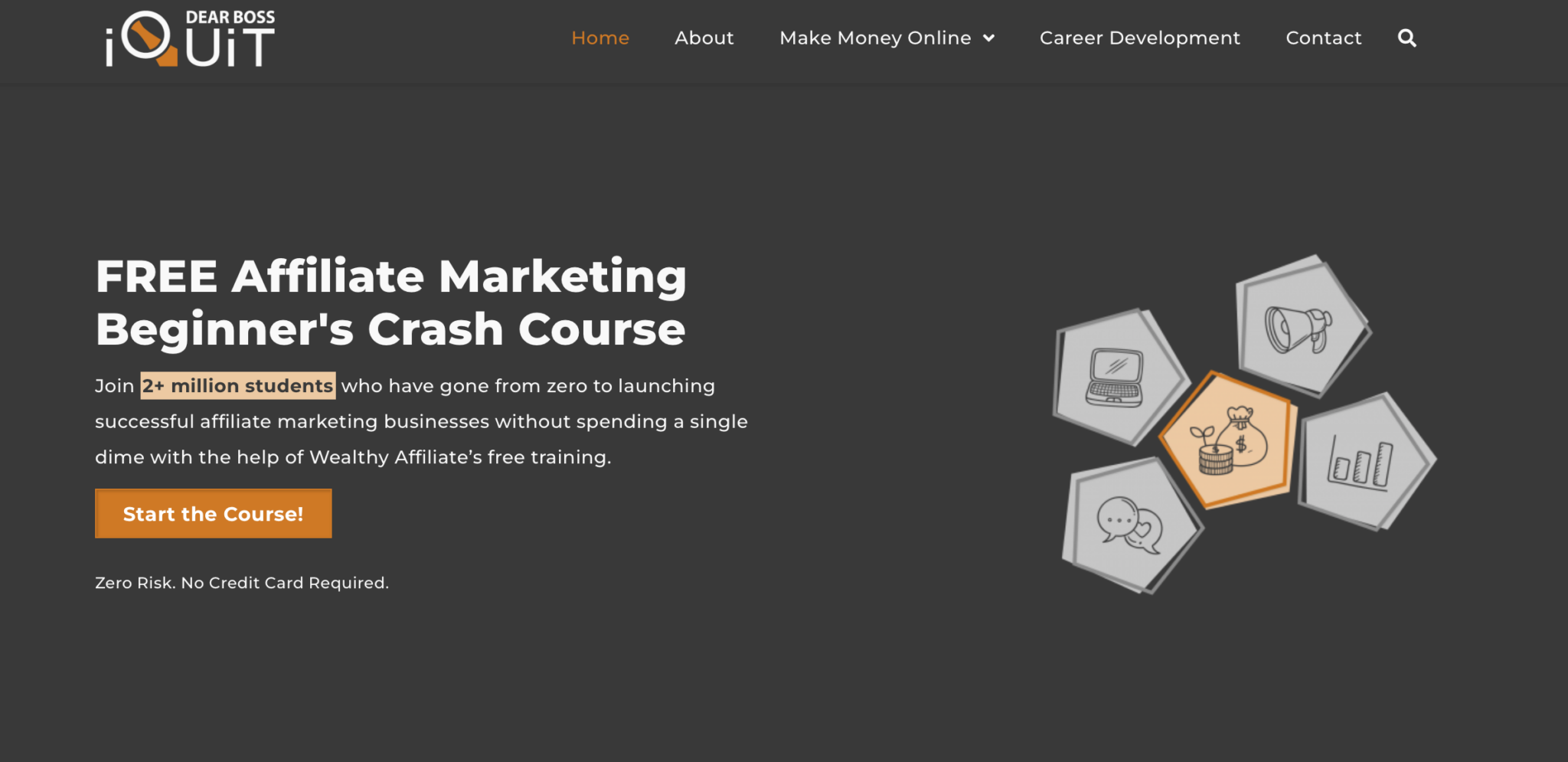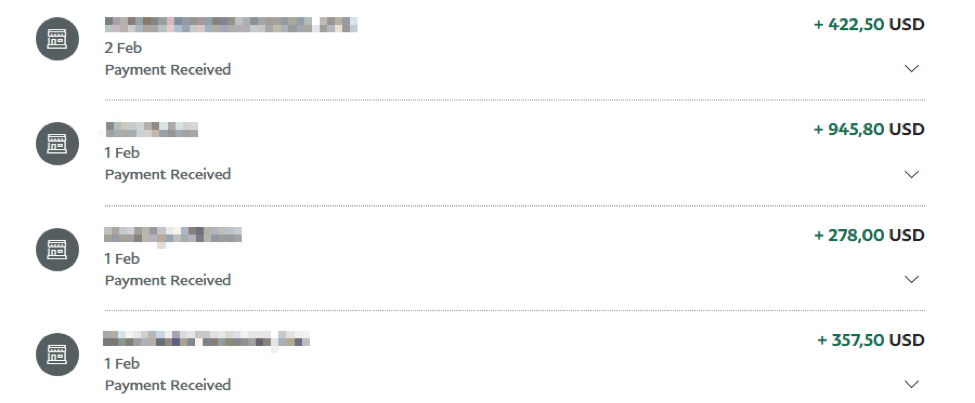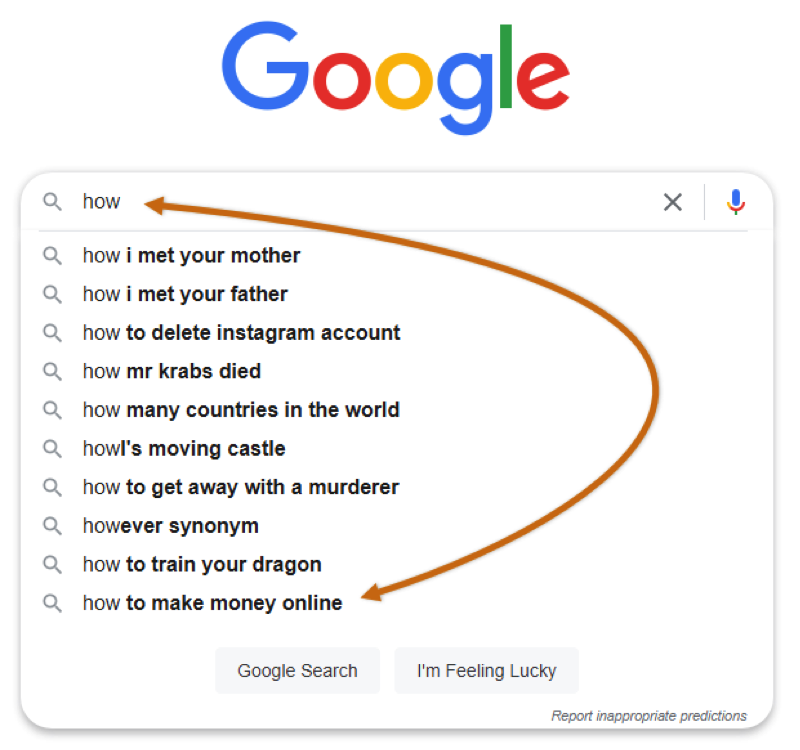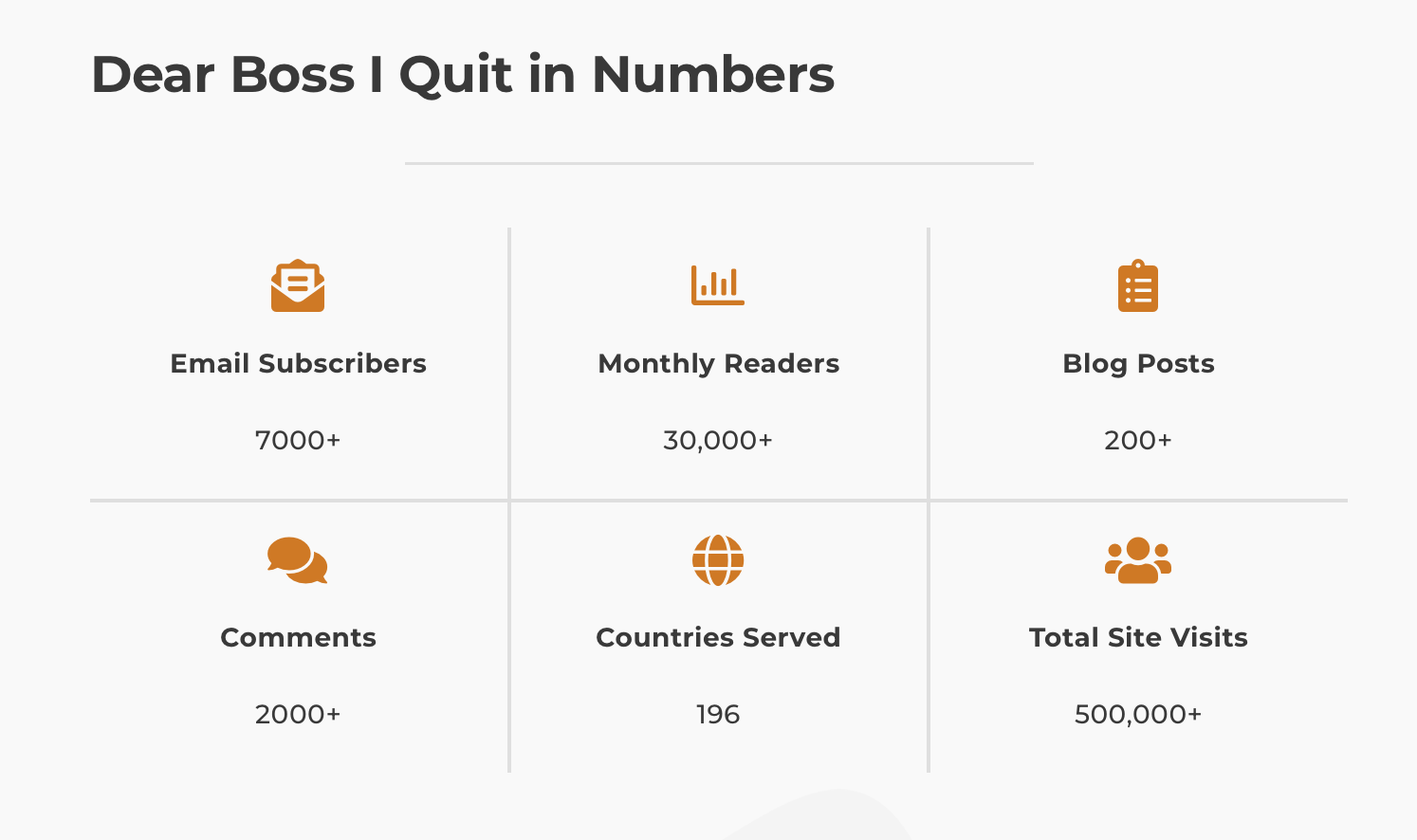How Harry Notis Built a $2k Per Month Affiliate Site From Trial & Error
Success Stories

If you’ve ever experienced burnout at work and longed to do something else for a living, Harry Notis’ story will probably resonate with you. Harry had a ‘great’ job at a courier company in his native Athens, Greece but was feeling apathetic and unhappy.
That’s when he discovered affiliate marketing.
After learning as much as he could on his own, he rolled up his sleeves and got to work. And his website about making money online, Dear Boss I Quit, was born. Through trial and error and experimentation, he learned from his mistakes and has grown his site to earn up to $2000 per month through affiliate marketing.
In this interview, Harry shares a lot of great tips he learned along the way, a very unique keyword research strategy, and invaluable advice for aspiring entrepreneurs.
A Little Bit About Harry Notis
I’m 31 years old, born and raised in Athens, Greece.
I’ve been passionate about computers and websites since I first got my hands on a Windows 95 laptop my father bought when I was ten years old.
I graduated from a vocational high school as a computer scientist and got admitted to an automation engineering college.
However, after attending classes for about a year, I lost interest, dropped out, and started fulfilling my compulsory military service. (Under Greek law, all adult males must serve in the country’s armed forces for 9 to 12 months.)
Once I got discharged, I started pursuing an education in computer networking.
Upon finishing my studies, I landed a part-time job at one of the largest courier companies in the world and quickly got promoted to full-time employee. The pay, the benefits, the insurance, the culture, and the coworkers were all pretty awesome.
However, there was a huge problem. I truly hated my day-to-day duties.
After sticking it out for a while, my mental and physical health started deteriorating. I gained weight, constantly felt burned out, and got sick much more often than usual. So I needed to start making drastic changes towards improving my situation ASAP, but I had no clue what to do or where to begin.
How he discovered Affiliate Marketing
That’s when I started browsing through blogs and forums, searching for info and advice that could point me in the right direction, and something that kept popping up as a potential solution was an online business model called “affiliate marketing.”
As I began investigating closer, I found out that affiliate marketing was being used by thousands of people around the world to build a passive income online.
I got intrigued and decided to give it a try.
I signed up for an affiliate course, purchased hosting, got a simple website up and running, and started experimenting with affiliate marketing in my spare time for no more than 1 or 2 hours per day.
Fast forward one year, my affiliate site was receiving up to 50,000 monthly visitors and yielding up to $2000 per month.
At that point, I started offering the skills I’d acquired while growing my affiliate site on a freelance basis. And after landing a few clients, I quit my job and have been working for myself ever since.
Why Harry Notis Created His Site
When I realized that my job was hurting my well-being, I knew that sooner or later, I’d have to quit and pursue a more enjoyable profession.
However, since I had no idea how to go about it, I started trying to figure out my next steps by consuming as much content as possible (books, blogs, videos, etc.) around career development topics.
I was accumulating hundreds of pages of invaluable career-related notes, info, and insights. So I decided to aggregate it all into a central hub that would educate and inspire anyone who might need help improving their career.
And that’s how Dear Boss I Quit came to be.
In the beginning, the site focused only on sharing helpful career tips and advice. However, after receiving requests from dozens of people who needed help making money online, I started expanding in the MMO niche.

Right now, DBIQ covers a multitude of subjects, from career development and affiliate marketing to MLM, surveys, money-making scams, and more.
Dear Boss I Quit’s Current Revenue
Dear Boss I Quit is currently bringing in $1000 to $1500 per month. But now and then, there are months when it yields up to $2000.
Around 95% of its total revenue is generated via promoting a handful of affiliate services distributed across 4 or 5 different merchants. The remaining 5% comes in through running Ezoic Display Ads.
Here’s a screenshot of DBIQ’s revenue for February 2022.

In total, 98% of the revenue brought in by DBIQ is profit. My only expenses involve the domain name and hosting of the site, which set me back no more than $300 per year.
Harry’s Main Strategies
My ultimate long-term goal for DBIQ is to turn it into a source of passive income. That’s why I invest most of my resources in SEO, and more specifically, in blogging and link building.
Contrary to other digital marketing channels like social media, if you do SEO the right way, you can keep getting your business in front of potential customers passively, with minimum or no extra effort.
For example, I have articles I published 2+ years ago that still rank on Google’s first page, receive a steady stream of traffic, and generate affiliate sales regularly with zero additional effort on my part.
Running a ‘1-Person Show’
Since I’m a one-person team and I’m still working on my site part-time, I don’t have the resources to experiment with as many marketing strategies as I’d like.
As such, for the time being, I’m devoting all my efforts to mastering the basics of my primary marketing strategy, SEO.
I believe that such an approach could be considered unique in the sense that a vast percentage of aspiring affiliates tend to focus way too much on implementing overcomplicated “unproven” techniques that deliver little results while completely neglecting the basics.
Nonetheless, something I do differently compared to other affiliates in terms of SEO is doing in-depth, manual keyword research.
The Importance of SEO for Harry Notis’ Site
SEO is responsible for 100% of DBIQ’s total revenue, so SEO is the bread and butter of my entire affiliate business.
As for my strategy, I’m just sticking with the basics.
I invest at least 70% of my time and resources into blogging. I.e. keyword research, competition analysis, writing, editing, etc.
The remainder is devoted to link building, primarily via guest blogging. This includes prospect & topic research, outreach, following up, writing, etc.
Keyword Research
Most affiliate marketers tend to estimate the quality of their keywords solely based on metrics generated by “dedicated” keyword research tools.
That’s exactly what I used to do, but after finding out the hard way that the vast majority of such tools are highly inaccurate, I decided to start taking matters into my own hands.
Right now, the primary tool I use to determine, analyze, and evaluate the search volume and competitiveness of keywords is Google’s search function.
If a keyword has no search volume or too much well-established competition, I usually steer clear of it because it’s unlikely to generate traffic and sales.
And frankly, I hate nothing more than wasting time writing articles that yield no ROI, so I always go the extra mile to ensure that the keywords I target have low competition and relatively decent search volumes.
Ultimately, proper keyword research involves a smaller investment and much higher returns than writing content around random keywords with no demand or too many seasoned competitors you won’t be able to outrank in a million years.
What Harry Notis’ process looks like
First, I head to Google and start typing my target keyword, letter by letter, until it appears in the autocomplete box below Google’s search field.
Once it does, I take stock of how many of its letters I’ve typed in.
The fewer the letters, the more search volume the keyword has.
That’s because the more popular a term is, the faster and more frequently Google Autocomplete suggests it.
The drawback to this approach is that there’s no way to determine a keyword’s exact search volume.
Nonetheless, in my mind, the correlation between the number of letters you have to type in before a keyword pops up on Google’s Autocomplete and its respective search volume looks something like this:
- # of Letters written: 1% – 20% = Search Volume: Very High
- # of Letters written: 21% – 40% = Search Volume: High
- # of Letters written: 41% – 60% = Search Volume: Average
- # of Letters written: 61% – 80% = Search Volume: Low
- # of Letters written: 81% – 100% = Search Volume: Very Low/None
For example, the keyword “How to make money online” has 20 characters, and as depicted in the screenshot below, it appears on Google’s Autocomplete box after typing its first 3.

3 characters out of a total of 20 corresponds to 15%.
Based on the correlation chart I outlined earlier, the search volume of the keyword “How to make money online” falls under the very high spectrum.
What Harry Notis Does Next
Now, once I’ve confirmed that my target keyword has a decent search volume, I proceed with a thorough competitive analysis.
First, I Google my target keyword. Then, I take stock of the websites that rank for it in the first 15 spots of Google’s SERPs.
If most of those websites are much more well-established than mine, I probably won’t bother covering the keyword because chances are that it won’t be able to rank in a position that actually receives traffic.
If most competing websites are as authoritative as mine, I start examining their content to figure out potential improvements, such as:
- Addressing more issues
- Offering a different point of view
- Doing more in-depth research
- Adding graphics and videos
- Quoting accurate data
- Referencing reliable sources
- Creating a better structure, etc.
Lastly, I write and publish a more engaging, in-depth, valuable piece that could outrank my competitors’ articles.
Link Building
The importance of leveraging link building depends on the sub-niche I pursue at any given time.
Dear Boss I Quit revolves around the MMO niche which, in turn, consists of hundreds of sub-niches I cover interchangeably over 6-month timeframes for experimentation purposes.
If one of the sub-niches I go after isn’t that competitive, I don’t pay much attention to link building and focus mainly on publishing as much valuable content as possible.
That’s because high-quality blog posts in niches with low competition tend to rank much higher on Google’s SERPs relatively fast and effortlessly, even without backlinks.
How he acquires links without outreach
On top of that, well-ranking content tends to attract backlinks passively anyway.
For example, six months into affiliate marketing, I published 50 articles in a low competition niche which ended up acquiring up to 2000 daily visits and hundreds of new backlinks without devoting a single second to active link building.

Ultimately, the less competitive a sub-niche is, the less I focus on link building.
The two link-building methods I’m using at the moment with satisfactory success are:
- HARO (Help a Reporter Out)
- Guest Blogging
I’ve also tried infographic outreach, but it wasn’t as effective, likely because I implemented it without any structure, planning, or organization when I was still inexperienced.
Chances are that I’ll give infographic outreach another go at some point.
Content Creation and List Building
I try my best to publish at least one high-quality article per week. However, lately, I’ve been continuously falling behind. As I mentioned, I’m currently doing affiliate marketing on a part-time basis.
I primarily get eyes on that content through SEO. I’ve superficially experimented with Instagram, Facebook, Pinterest, Quora, and Medium throughout the years, but without much success.
I also have an email list of about 6000 subscribers, but I have yet to utilize it as much as I should, mainly due to lack of time.
Achieving Current Revenue Levels
Growing Dear Boss I Quit to its current revenue level took about a year to a year and a half of less than part-time work, around 1 to 3 hours per day.
I believe that if I’d devoted more hours per day, I’d have gotten there a lot faster.
Current Stats and Traffic
Dear Boss I Quit used to receive up to 50,000 visitors per month.
However, after I stopped covering topics in a non-evergreen niche about a year ago, the site lost roughly 30,000 monthly users.
As a result, DBIQ’s traffic has now dropped between 15,000 and 20,000 per month, as depicted below.

The good news is that this lost traffic had zero interest in purchasing the affiliate products I promoted, so DBIQ’s revenue was minimally affected.
That’s precisely why I decided to ditch that niche in the first place. It was unmonetizable, and going after it was a waste of time and effort.
Here are my current stats:

Harry’s Favorite Tools
The three most valuable tools for running and growing my affiliate site are:
- Ahrefs
- Grammarly
- Google Search
Ahrefs
Ahrefs helps me discover new keywords, analyze competitors, monitor my site’s rankings, audit and improve my SEO, locate guest blogging prospects, and more.
Grammarly
Grammarly is a typing assistant that suggests improvements to spelling, grammar, punctuation, and clarity. It also detects mistakes within written texts. Since I’m not a native English speaker, I’ve always had great trouble communicating confidently and effectively in English.
Thankfully, Grammarly has helped me take my English writing skills to another level by recommending text corrections that make my content look and sound much more natural and professional. As such, I consider Grammarly an invaluable tool in my arsenal as an affiliate marketer.
Google Search
Last but not least, I use Google’s search function to accurately determine and analyze the search volume and competitiveness of keywords I’d like to target. If a keyword has no search volume or too much well-established competition, I usually steer clear of it because it’s unlikely to generate any traffic and sales.
Like I said earlier, there’s nothing I hate more than wasting time writing articles that yield no ROI. So I always go the extra mile to ensure that the keywords I target have low competition and relatively decent search volumes.
His Main Challenges
The biggest challenge I’ve encountered while growing my business was maintaining consistency.
Taking consistent action towards any worthwhile goal is generally hard because the process of achieving success is much more painful and uncomfortable than just staying put.
That’s precisely why a vast percentage of aspiring entrepreneurs end up quitting a couple of months after launching their venture. However, I wasn’t willing to let that become me.
Over my first few months into affiliate marketing, I consciously pushed myself to work on Dear Boss I Quit every single day without exception.
Eventually, taking action became a habit, and I couldn’t help but remain consistent. Right now, growing DBIQ has become such an integral part of my daily life that I have to push myself to stop and take a day off.
His Most Important Accomplishment
My most significant accomplishment regarding Dear Boss I Quit occurred a few weeks ago when I got contacted by a very well-known company in the online counseling niche that wanted to publish a couple of paid guest posts on DBIQ’s blog.
After settling on a price, they sent me their guest posts already structured, edited, and optimized for publishing, and once I got them up and running, they paid me $1000.
The whole process took me no more than 2 hours. That’s by far the most money I’ve ever made for 2 hours of work up to this point in my life.
What Harry Notis Wishes He Knew When He Started
One thing I wish I’d known during the early phases of my journey is that in some niches, link building matters a lot.
When I first ventured into affiliate marketing, I started consuming immense amounts of info about SEO from any available source, such as YouTube, courses, blogs, etc.
Over that time, I kept coming across SEO “experts” who insisted that link building was worthless and that creating content was enough to successfully grow a site.
After taking their word for it, I focused all my resources on publishing as much quality content as possible without paying any attention to link building.
The result?
Having dozens of articles ranking nowhere near Google’s first page and receiving no traffic whatsoever.
What He Realized
What I realized in hindsight was that, while not building backlinks could get you somewhere in a low-competition niche, lacking backlinks while going up against well-established competitors will most likely get you trampled.
If I’d known this initially, my site would have progressed twice as fast, but I guess trial and error will always be an integral part of the learning process involved in starting something new.
His Biggest Mistake
The biggest mistake I’ve made on my entrepreneurial journey was investing in a low-quality, non-evergreen, non-monetizable niche.
About six months into my affiliate marketing journey, I stumbled upon a niche with massive search volumes that appeared to be completely untapped.
I thought I’d hit a goldmine, so I did some keyword research, uncovered 50 relevant keywords, and devoted the next six months to publishing high-quality articles covering them.
By the time I got all the 50 articles live, my traffic had increased by 1900%, reaching up to 2000 users per day.
Unfortunately, since the topics I’d covered weren’t evergreen, that traffic started declining a couple of months later until it eventually died out altogether, bringing my daily visits down to roughly 600.
The good news is that the audience within that niche wasn’t interested in purchasing the products I was promoting in the first place, so DBIQ’s revenue wasn’t really affected.
Learning From These Mistakes
This mistake set my business’s progress back about six months but taught me three invaluable lessons:
- Going after a non-evergreen niche isn’t worth the trouble unless it’s incredibly profitable
- Building passive income by pursuing a non-evergreen niche is impossible
- More traffic doesn’t necessarily equal more revenue
Harry Notis’ Advice for Other Entrepreneurs
Stick with it. I know that the process might initially seem highly daunting, especially when you put in tons of effort for no tangible short-term reward.
However, that’s what growing a business to success looks like.
The process involves a steep learning curve, tons of trial and error, a lot of upfront, usually unpaid work, many setbacks, and massive amounts of patience and commitment.
Perseverance Pays Off
The good news is that things will keep getting easier as you move along, particularly when your first profits start trickling in.
At that point, making progress will feel much more effortless, and you’ll be running a successful business before you know it.
Something you should keep in mind is that the key to becoming a successful entrepreneur is always to prioritize helping others over selling.
Making sales is merely a byproduct of helping your target audience solve a problem. If you don’t help, you’ll be making no sales (unless maybe you’re an exceptional salesperson).
I wish you all the luck in the world throughout your entrepreneurial journey!



